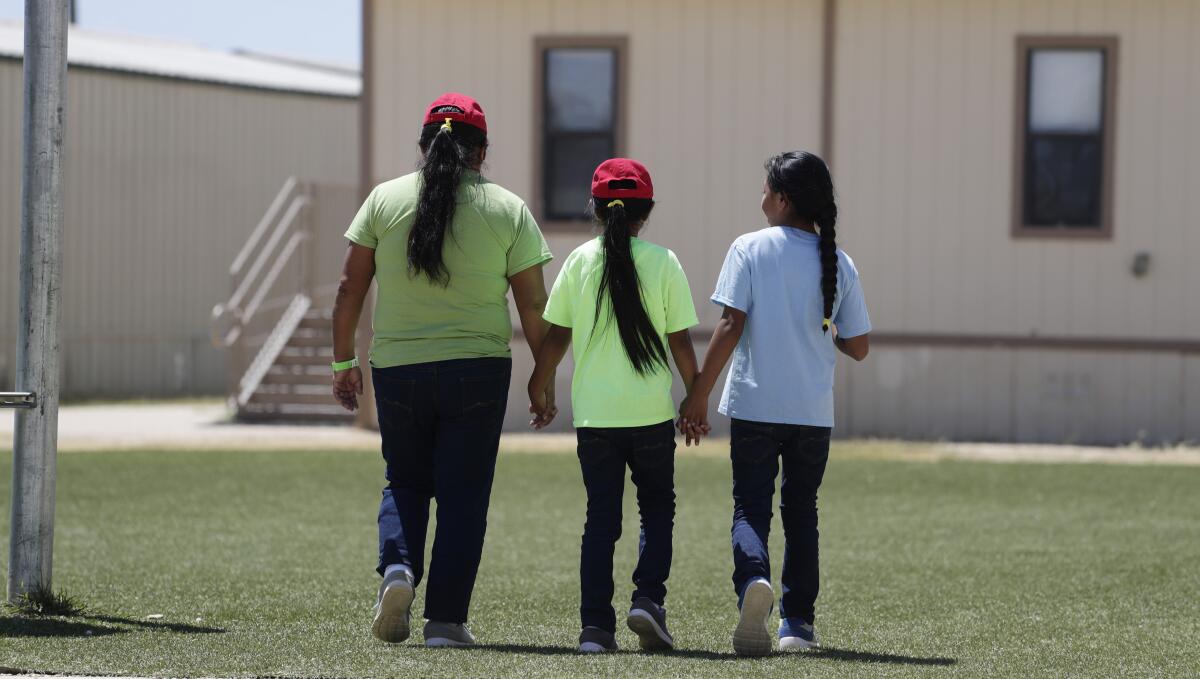ICE detention centers preparing for longer average stays by migrant families

- Share via
DILLEY, Texas — The acting chief of U.S. Immigration and Customs Enforcement said Friday during a tour of a Texas migrant family detention center that the federal agency was preparing for the average stay for families to increase from 10 days to up to 50 days.
Matthew Albence, who was at a center about 90 miles north of the U.S.-Mexico border in Dilley, said an adjustment of detention centers by the Trump administration was expected to include medical and educational services to address families’ needs as they stay longer. He also said services at the Dilley center — including a clinic, dental office and charter school — were already “robust.”
The new administration rule, set to take effect in 60 days, would allow Immigration and Customs Enforcement to detain families with children beyond a 20-day limit imposed by the 1997 Flores court settlement, which governs detention conditions for migrant children. It is expected to face legal challenges.
The center Albence was at Friday includes a 2,400-bed cluster of trailers housing mothers with children. There were 900 migrant family members at the Dilley detention center Friday, immigration officials said.
ICE has not received additional funding to handle increased family detentions. Albence unsuccessfully appealed to Congress this year for $81 million to add 960 migrant family detention beds. He said ICE is considering converting a roughly 700-bed family detention center built in 2014 in Karnes City, Texas, that since April has been used to house migrant women, back to a family detention center.
Albence said his agency had no plans to erect temporary family detention centers at military bases like those built to house unaccompanied migrant children in Texas in the past.
Migrant advocates disagree that services at the Dilley center are robust, and have particularly faulted medical services managed by prison contractor CoreCivic. A migrant mother held at the center last year sued the company and the government, alleging conditions and lax medical care contributed to the illness of her 21-month-old daughter, who died after they were released. The company denies wrongdoing, and says that the federal government is responsible for oversight of healthcare at the facility.
Not all asylum-seeking families arriving at the border will be detained long-term once the new rule takes effect, officials said during Friday’s tour. Some may be sent back across the border under other Trump administration policies including the “Remain in Mexico” program or the asylum ban that a judge allowed to proceed in New Mexico and Texas. Still others may be released with notices to appear in court, ankle monitors or telephone monitoring.
Long-term family detention has been criticized by both migrant advocates and fiscal conservatives as the most expensive of those options, about $319 a day, according to the ICE budget.
Albence said it was cost-effective in that it ensured migrants appeared in court and, if a judge so ordered, were deported.
But Silky Shah, executive director of Washington-based Detention Watch Network, said long-term migrant family detention “creates intense amounts of trauma with terrible medical care.... We’re spending a bunch of taxpayer money to pay private prison companies that are cutting costs at every level.”
More to Read
Updates
10:59 p.m. Aug. 24, 2019: This story has been updated to reflect that CoreCivic, a contractor that has been sued over lax medical care at the detention facility, denies any wrongdoing or responsibility in the case.
Sign up for Essential California
The most important California stories and recommendations in your inbox every morning.
You may occasionally receive promotional content from the Los Angeles Times.











